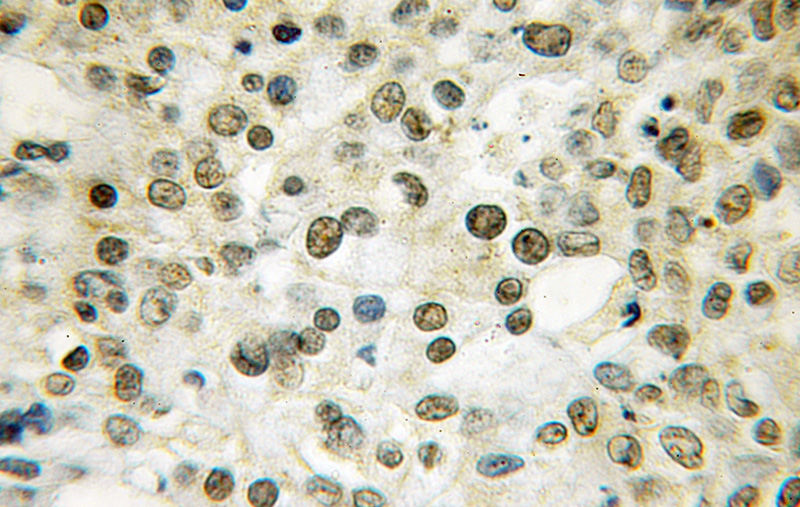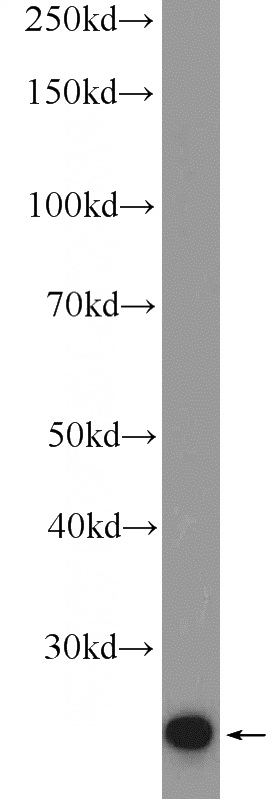-
Product Name
THAP1 antibody
- Documents
-
Description
THAP1 Rabbit Polyclonal antibody. Positive IHC detected in human colon cancer tissue. Positive WB detected in HEK-293 cells, A375 cells, HeLa cells, HepG2 cells, human brain tissue, human heart tissue, mouse brain tissue, mouse heart tissue, SGC-7901 cells. Observed molecular weight by Western-blot: 30kd
-
Tested applications
ELISA, IHC, WB
-
Species reactivity
Human,Mouse,Rat; other species not tested.
-
Alternative names
FLJ10477 antibody; THAP1 antibody
-
Isotype
Rabbit IgG
-
Preparation
This antibody was obtained by immunization of THAP1 recombinant protein (Accession Number: NM_018105). Purification method: Antigen affinity purified.
-
Clonality
Polyclonal
-
Formulation
PBS with 0.1% sodium azide and 50% glycerol pH 7.3.
-
Storage instructions
Store at -20℃. DO NOT ALIQUOT
-
Applications
Recommended Dilution:
WB: 1:500-1:5000
IHC: 1:20-1:200
-
Validations

Immunohistochemical of paraffin-embedded human colon cancer using Catalog No:116037(THAP1 antibody) at dilution of 1:50 (under 40x lens)

HEK-293 cells were subjected to SDS PAGE followed by western blot with Catalog No:116037(THAP1 Antibody) at dilution of 1:1000
-
Background
THAP1 belongs to the THAP1 family. It is a DNA-binding transcription regulator that regulates endothelial cell proliferation and G1/S cell-cycle progression. THAP1 may also have pro-apoptopic activity by potentiating both serum-withdrawal and TNF-induced apoptosis. Mutations in THAP1 have been associated with dystonia 6. THAP1 encodes a transcription factor with mostly unknown targets. It regulates the expression of DYT1 (TOR1A), another dystonia-causing gene. After characterization of the TOR1A promoter, THAP1 binds to the core promoter of TOR1A. Wild type THAP1 represses the expression of TOR1A, whereas dystonia 6-associated mutant THAP1 results in decreased repression of TOR1A. Catalog#12584-1-AP is a rabbit polyclonal antibody raised against full-length of huamn THAP1.
-
References
- Zhao Y, Xiao J, Gong S, Clara JA, Ledoux MS. Neural expression of the transcription factor THAP1 during development in rat. Neuroscience. 231:282-95. 2013.
- Ortiz-Virumbrales M, Ruiz M, Hone E. Dystonia type 6 gene product Thap1: identification of a 50 kDa DNA-binding species in neuronal nuclear fractions. Acta neuropathologica communications. 2:139. 2014.
- Ruiz M, Perez-Garcia G, Ortiz-Virumbrales M. Abnormalities of motor function, transcription and cerebellar structure in mouse models of THAP1 dystonia. Human molecular genetics. 24(25):7159-70. 2015.
- Nayak RR, Bernal WE, Lee JW, Kearns MJ, Cheung VG. Stress-induced changes in gene interactions in human cells. Nucleic acids research. 42(3):1757-71. 2014.
- Gavarini S, Cayrol C, Fuchs T. Direct interaction between causative genes of DYT1 and DYT6 primary dystonia. Annals of neurology. 68(4):549-53. 2010.
- Kaiser FJ, Osmanoric A, Rakovic A. The dystonia gene DYT1 is repressed by the transcription factor THAP1 (DYT6). Annals of neurology. 68(4):554-9. 2010.
Related Products / Services
Please note: All products are "FOR RESEARCH USE ONLY AND ARE NOT INTENDED FOR DIAGNOSTIC OR THERAPEUTIC USE"
